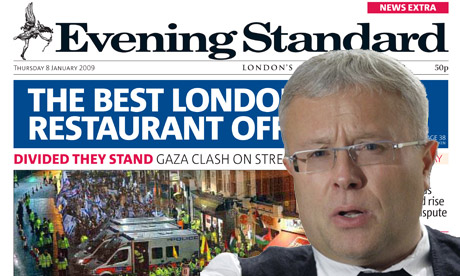guardian.co.uk
January 14

Alexander Lebedev: read the Evening Standard when he was a young KGB agent. Photographs: AP/Public domain
The billionaire and former KGB agent Alexander Lebedev is to buy London's Evening Standard tomorrow, in a dramatic move that would see him become the first Russian oligarch to own a major British newspaper, MediaGuardian.co.uk can reveal.
Lebedev is poised to buy a controlling stake in the ailing title, following a year of secret negotiations with Lord Rothermere, its owner and the chairman of the Daily Mail & General Trust.
Under the terms of the deal Lebedev will purchase 76% of the newspaper, with the Associated Newspapers group retaining 24%. His son Evgeny, who lives in London, is due to sign the deal with Daily Mail & General Trust tomorrow. The agreement will make Lebedev the paper's controversial new proprietor.
A source close to DMGT admitted: "The deal is still very much alive." DMGT failed to comment.
The purchase will be an astonishing moment in British press history – the first time a former member of a foreign intelligence service has owned a British title. Speaking to MediaGuardian.co.uk on Wednesday, Lebedev said he had read the Evening Standard and other British newspapers when he was a young spy at the Soviet embassy in London in the late 1980s.
"I had to read every newspaper. I was there for that," he recalled. "I had to read the FT, the Guardian, Standard and the Daily Mail." The Standard was "a very good newspaper" with some "brilliant journalists," Lebedev said, adding that the Daily Mail was a "highly influential" title that closely reflected British public attitudes.
The Standard's sale to an ex-Russian spy is likely to have been discussed at the highest levels of government. It follows three years of fraught relations between London and Moscow following the November 2006 murder in London of Russian dissident Alexander Litvinenko – and the Kremlin's refusal to extradite Andrei Lugovoi, his alleged killer.
In Russia, however, Lebedev is known as a semi-opposition figure who has frequently been at odds with Vladimir Putin, Russia's former president and current prime minister. In 2003 he ran unsuccessfully against Moscow's pro-Kremlin mayor Yuri Luzhkov. Lebedev is also part owner of the critical Novaya Gazeta paper, one of the last sources of media opposition inside Russia to the government.
Last night Lebedev said he had no intention of interfering in British politics if he became the Standard's new owner. "My influence would be next to zero," he declared. He promised an "absolutely" hands-off approach, and said it would be up to the Standard's editor-in-chief and journalists to agree the paper's editorial line.
But it is understood that the Standard's editorial direction would inevitably change. The paper would be less under the influence of its sister paper, the Daily Mail, sources suggest, and would not necessarily reflect the Mail's rightwing editorial line. It would probably continue, however, to support Boris Johnson, London's Conservative mayor, they add.
The Daily Mail group is likely to fund the cost of redundancies for some Standard journalists, it is understood. The Russian tycoon also wants to establish a new editorial and advisory board for the Standard. This could include heavyweight global figures such as Mikhail Gorbachev – the former Soviet president and Lebedev's personal friend – as well as Tony Blair, former French president Jacques Chirac and leading Russian editors.
It was last night not clear how much Lebedev is paying for the Standard. Before the credit crunch, Forbes listed him 39th among Russia's top 100 billionaires, with a $3.1bn fortune. He puts his own wealth now at $2.5 billion. His portfolio includes one of Russia's largest private banks, a 30% stake in Aeroflot, Russia's state airline, and other interests including a London restaurant and a luxury Italian hotel.
On Wednesday Lebedev, who holds an annual fundraising event in London to support a charity for children with cancer, said he accepted it would be difficult to revive the Standard's flattening circulation. But he said he was keen to own the newspaper since – as a figure working outside the Kremlin – he has exhausted the publishing possibilities in his native Russia.
"As far as I'm concerned this [buying the Standard] has nothing to do with making money. There are lots of other ways. This is a good way to waste money," he told the Guardian.
The Evening Standard is facing a combination of the industry-wide downturn in advertising, the shift of readers to the internet and a war of attrition in London with rival News International. The two publishing companies have waged a bitter loss-making battle since launching their respective free afternoon papers, London Lite and the London Paper, in 2006.
Associated Newspapers, the DMGT subsidiary that also publishes the morning fresheet Metro, launched London Lite partly to protect the Standard against the London Paper. In November it emerged that DMGT had sought a truce of some kind with News International, an offer that was rebuffed. It has instead looked at a range of radical options for the Evening Standard – which now include its sale to a cash-rich Russian businessman.
Mr. Lebedev don't want to make money out of the Standard which he knew very well as a former KGB spy. The good Samaritan and the friend of the media.
Russian oligarchs, tycoons, former whatever always were interested - not for profit, of course - in the media. For the moment, remember the Gazprom-NTV case, only 8 years ago:
http://news.bbc.co.uk/2/hi/business/1595416.stm
http://cpj.org/2001/04/gazprom-occupies-ntv-headquarters.php
http://www.eng.yabloko.ru/Publ/2001/Papers/mtimes-040401.html
No comments:
Post a Comment